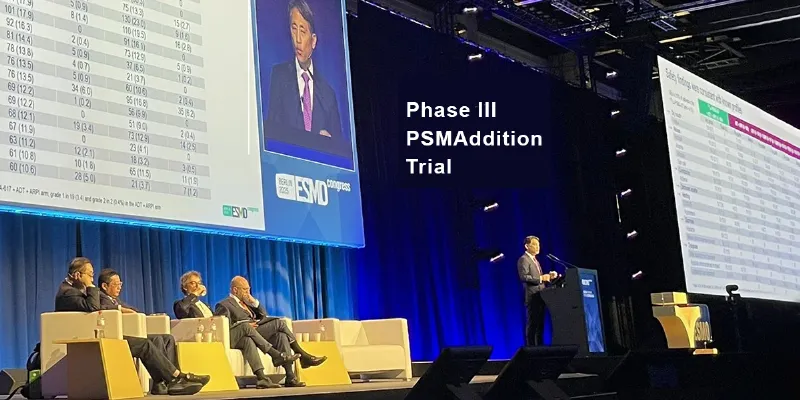Radioligand Therapy Pluvicto Reduces Progression Risk by 28% in mHS Prostate Cancer

5 November 2025
Results from the Phase III PSMAddition trial show that adding the radioligand therapy Pluvicto (177Lu-PSMA-617) to androgen deprivation therapy and an ARPI reduced the risk of disease progression or death by 28% in PSMA-positive metastatic hormone-sensitive prostate cancer (mHSPC). The combination also delayed castration resistance and showed a favorable safety profile with manageable toxicity.
The ESMO 2025 Presidential Symposium highlighted a potential paradigm shift in metastatic prostate cancer management. New results from the Phase III PSMAddition trial demonstrated that the radioligand therapy Pluvicto™ (lutetium-177 vipivotide tetraxetan), when combined with androgen deprivation therapy (ADT) and an androgen receptor pathway inhibitor (ARPI), significantly reduced the risk of disease progression or death in men with prostate-specific membrane antigen–positive (PSMA+) metastatic hormone-sensitive prostate cancer.
At a median follow-up of 23.6 months, the combination reduced the risk of radiographic progression or death by 28% compared with ADT plus ARPI alone. A positive trend in overall survival (OS) was also observed, although data remain immature.
Early use of radioligand therapy
Beyond rPFS, the study demonstrated that adding Pluvicto delayed progression to metastatic castration-resistant prostate cancer (mCRPC) by 30% (HR 0.70; 95% CI: 0.58–0.84). More patients in the Pluvicto arm achieved a complete response (57.1% vs 42.3%) and the overall response rate (ORR) was higher (85.3% vs 80.8%). These benefits were consistent across all prespecified subgroups, including those defined by disease volume, metastatic pattern, and prior local therapy.
“In metastatic prostate cancer, choosing the most efficacious treatment early is crucial, even at initial diagnosis,” said Dr. Scott T. Tagawa, Professor of Medicine at Weill Cornell Medicine and investigator of the study. “These findings suggest that combining 177Lu-PSMA-617 with standard of care hormonal therapy offers patients more time without disease progression, a safety profile with adverse events that are most often low grade and managed with supportive care, and an encouraging trend in overall survival.”
Safety consistent with prior trials
The safety profile of Pluvicto was consistent with previous PSMAfore and VISION trials. Grade 3 or higher adverse events occurred in 50.7% of patients on the combination versus 43% on standard therapy. The most frequent all-grade toxicities were dry mouth, fatigue, nausea, hot flush, and anemia—mostly mild and manageable with supportive care.
Commenting on the results, Prof. Arun Azad of the University of Melbourne noted that while the study met its primary endpoint, interpretation of overall survival data will be critical before practice-changing conclusions can be drawn. “At present, ~47% of the OS events have occurred, but the data do not indicate significance at this stage. However, there are long-term toxicities associated with 177Lu that typically take longer than 2 years to emerge and include secondary myeloid neoplasms, such as myelodysplastic syndrome, and renal impairment. These may be rare, but they are important to track over the next 5–10 years,” he said.
Quality of life and treatment implications
Despite a higher incidence of adverse events, investigators reported no deterioration in quality of life compared with standard therapy. This aligns with the growing role of radioligand therapies in balancing efficacy with patient-reported outcomes.
However, questions remain about optimal dosing duration. Some experts suggested that evaluating patients after two cycles might identify who benefits most from extended therapy, minimizing cumulative toxicity.
Expanding the role of Pluvicto in prostate cancer
Pluvicto is a PSMA-targeted radioligand therapy (RLT) that links a radioactive isotope (lutetium-177) to a molecule designed to bind PSMA-expressing prostate cancer cells, delivering localized radiation to destroy malignant tissue while sparing healthy cells.
It is already approved for pre-taxane metastatic castration-resistant prostate cancer (mCRPC) following positive results from PSMAfore, and now PSMAddition positions it as a promising option for patients with earlier-stage metastatic disease.
According to Shreeram Aradhye, President of Development and Chief Medical Officer at Novartis, “With significant benefit now shown across multiple disease stages, Pluvicto is redefining the standard of care. The strength of these results reflects our deep commitment to patients with prostate cancer and our leadership in radioligand therapy.”
Regulatory outlook and next steps
Novartis plans to submit the PSMAddition data to regulatory authorities by the end of 2025, a move that could double the number of patients eligible for Pluvicto worldwide. If approved, it would mark the first PSMA-targeted radioligand therapy to demonstrate clinical benefit in both hormone-sensitive and castration-resistant prostate cancer.











Comments
No Comments Yet!